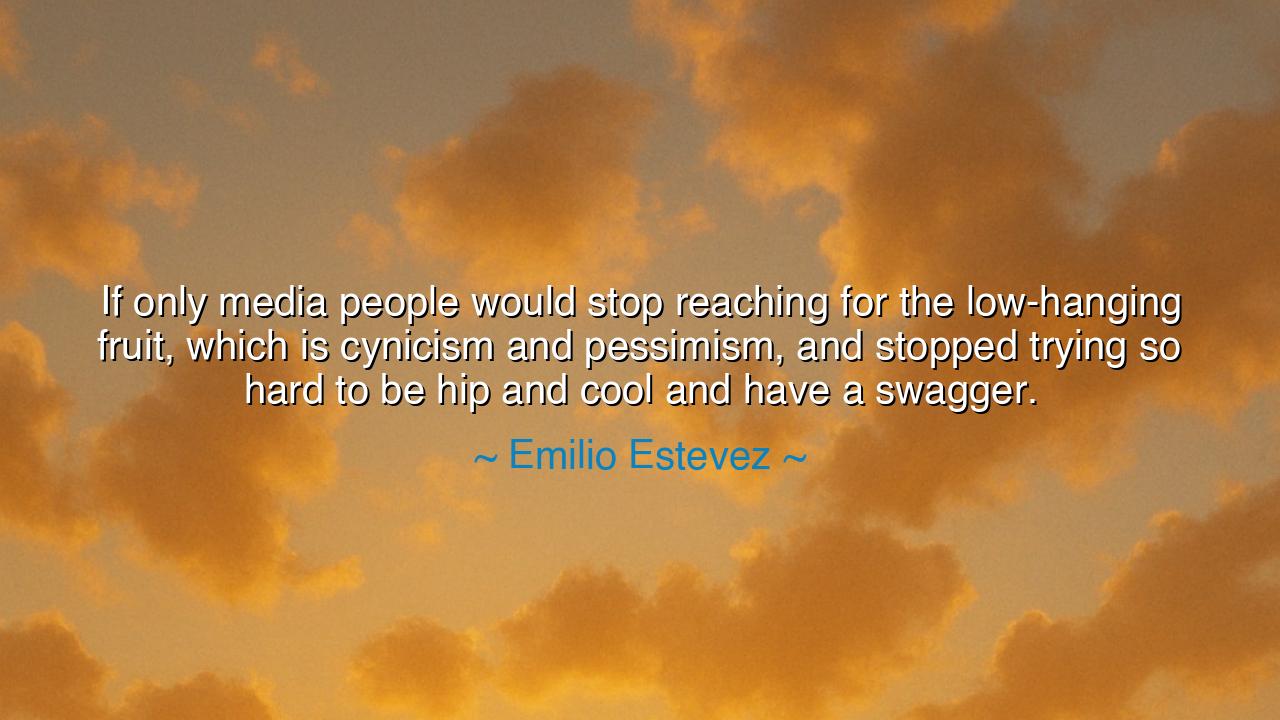
If only media people would stop reaching for the low-hanging
If only media people would stop reaching for the low-hanging fruit, which is cynicism and pessimism, and stopped trying so hard to be hip and cool and have a swagger.






In a world where the noise of society often drowns out the voice of truth, Emilio Estevez’s words resonate with a profound wisdom: "If only media people would stop reaching for the low-hanging fruit, which is cynicism and pessimism, and stopped trying so hard to be hip and cool and have a swagger." Here, Estevez calls out the tendency to lean into the easy and shallow narratives that serve only to degrade the human spirit, rather than elevate it. Cynicism and pessimism are the low-hanging fruit of modern media—quick to grasp, but devoid of substance and nourishment. It is far easier to mock the world than to offer hope, but it is in offering hope and insight that the media truly serves the people.
In the ancient world, great philosophers and thinkers often found themselves in conflict with the prevailing pessimism of their time. Socrates, for instance, was an advocate of inquiry and the search for truth, not as a means of indulging in mockery or despair, but as a way of elevating the soul. To him, the pursuit of wisdom was not about presenting the world as a dark, corrupt place, but about illuminating the path forward with righteousness and purpose. Like Estevez, Socrates rejected the temptation to simply “play to the crowd” with easy cynicism, instead choosing to engage in deeper, more meaningful conversations about the nature of humanity.
Consider the story of the Renaissance, when the world was emerging from the darkness of the medieval era. Leonardo da Vinci, Michelangelo, and Galileo rejected the cynicism of their age and, instead, sought to push the boundaries of human knowledge and artistic expression. They did not succumb to the temptation to mock the world or to project a sense of inevitable failure. Instead, they pursued the ideal, creating masterpieces and groundbreaking discoveries that changed the course of history. They sought, as Estevez urges, to reach for more than the low-hanging fruit—they reached for the heights of human potential, and in doing so, they reshaped the world.
The media, however, often falls into the trap of seeking the easy path to popularity, choosing to indulge in mockery, scandal, and sensationalism. These fleeting attempts to gain attention and validation by appealing to the lowest common denominator are akin to the tactics of ancient demagogues who sought power through fear and division. Just as Pericles, the Athenian leader, warned against the dangers of demagoguery, we must recognize that the media, when driven by cynicism and the desire to be cool or hip, does a disservice to society. It distracts us from the noble pursuit of truth, hope, and action.
But Estevez’s call is not just a critique; it is a call to action. It is an invitation to rise above the easy cynicism that pervades much of modern discourse. To rise above the impulse to be trendy or to project a false sense of swagger is to tap into a deeper truth. When we turn away from the shallow waters of mockery and despair, we begin to swim in the deeper currents of wisdom, compassion, and action. Just as the ancient philosophers sought to engage the mind with reason and integrity, so too can we elevate our discourse, both in the media and in our personal lives, by offering ideas that are built on the foundations of hope, truth, and honor.
The lesson here is profound: we must resist the temptation to indulge in quick wins—whether it be in media, in politics, or in life—that offer only temporary satisfaction. Instead, we must be willing to reach higher, to seek truth and goodness, even when it requires effort and commitment. In a world that often celebrates surface-level achievements, we are called to look beyond the fame and the swagger, to create a legacy that is built on substance and integrity.
In practical terms, this means questioning the narratives that are often presented to us as truths, seeking deeper understandings of the world around us, and encouraging those around us to do the same. It means rejecting the easy temptation of cynicism, and instead striving to make our words, our actions, and our creations meaningful. Whether through media, art, or simply in our daily lives, we must choose to elevate the discourse—to embrace hope, to foster understanding, and to lead with courage in the pursuit of a better world. Let us follow the path of those who, like the great thinkers and creators of the past, chose to lift humanity up, rather than drag it down with empty promises of coolness or swagger.






AAdministratorAdministrator
Welcome, honored guests. Please leave a comment, we will respond soon